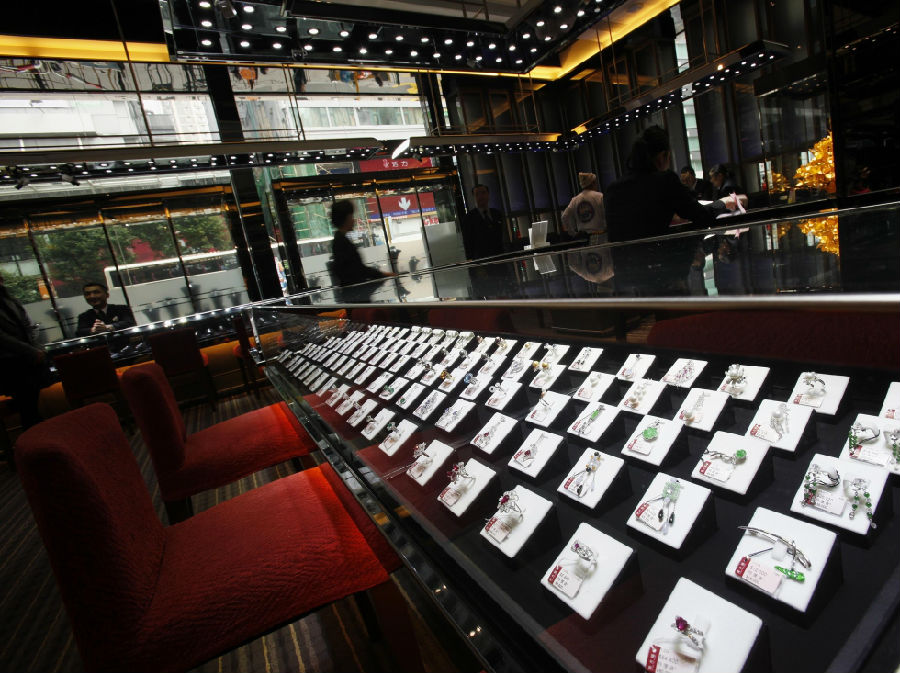Money laundering law could extend to non-financial firms
2014-05-28
■Jewellers could, in future, be subject to fresh legislation against money laundering. Photo: Reuters
The Hong Kong government is expected to extend the law against money laundering – now applicable only to the financial sector – to lawyers, accountants, property agencies and jewellery shops, industry observers say.
If the Anti-Money Laundering and Counter-Terrorist Financing (Financial Institutions) Ordinance (AMLO) is extended to these sectors, the number of suspicious transactions they report is likely to increase, said Simon Deane, a partner at Deacons, one of Hong Kong’s oldest law firms.
“I would expect there to be a spike in the number of reports filed with the Joint Financial Intelligence Unit from some of these sectors, because they would be obliged by law to conduct client due diligence,” Deane said.
AMLO, which took effect on April 1, 2012, covers banks, securities companies and insurance firms, as well as money service operators (remittance agents and foreign exchange firms).
Deane said it is possible that the law will be extended to other sectors, like lawyers, property agents, jewellers and accountants.
The government appears to be willing to do so.
A spokeswoman for the Financial Services and Treasury Bureau said, “We will consider appropriate regulatory or legislative measures to enhance the anti-money-laundering and counter-financing-of-terrorism standards for non-financial businesses in Hong Kong.”
The government has been working closely with those in non-financial businesses, including lawyers, accountants, trust and company service providers, estate agents and dealers of jewellery, in implementing anti-money-laundering and counter-financing-of-terrorism measures, she said.
It is in “close dialogue with the relevant professional organisations, including intensive efforts in collaboration with these organisations, to enhance practitioners’ awareness about anti-money-laundering and counter-financing-of-terrorism [measures]. We will continue with these efforts,” the spokeswoman said.
A big money-laundering challenge that many solicitors’ firms have encountered over recent years is where mainland clients attempt to deposit large amounts of cash into the firms’ accounts with their banks’ New Territories branches to settle fees or in payment for property purchases SIMON DEANE, DEACONS
Deacons has made nine reports about suspicious transactions since 2010, an increase from previous years, Deane said.
“A big money-laundering challenge that many solicitors’ firms have encountered over recent years is where mainland clients attempt to deposit large amounts of cash into the firms’ accounts with their banks’ New Territories branches to settle fees or in payment for property purchases,” he said.
The increase in reports of suspicious financial transactions by law firms in Hong Kong, including Deacons, is largely due to the Law Society’s Practice Direction P, introduced in 2009, which requires solicitors and registered foreign lawyers to conduct anti-money-laundering due diligence into clients, Deane said.
Unlike AMLO, Practice Direction P is not legally binding, and compliance is only voluntary, he said.
“AMLO has been a game changer in Hong Kong,” said Michael Thomas, North Asia director of Wolters Kluwer, a global firm that provides information services to professionals.
“The effect of AMLO is the only way people can protect themselves is to report everything that is mildly suspicious. That’s why there has been a huge jump in reports of suspicious transactions since AMLO took effect in 2012.
“With AMLO, it is a criminal offence not to report something you ought to have found suspicious.”
The number of reports to Hong Kong police of suspicious financial transactions rose 40 per cent to 33,000 last year, the South China Morning Post reported earlier.
AMLO requires that banks, insurance companies and securities firms conduct due diligence into their clients, while previously this was not mandated by law.
Bankers can go to prison if they don’t comply with AMLO, while a bank could lose its licence if it consistently failed to conduct due diligence on its clients or report suspicious transactions, Deane said.
AMLO may be extended to non-financial sectors in the medium to long term rather than the short term, because it will create extra costs for those sectors, said Wilson Lai, market manager at Wolters Kluwer.




